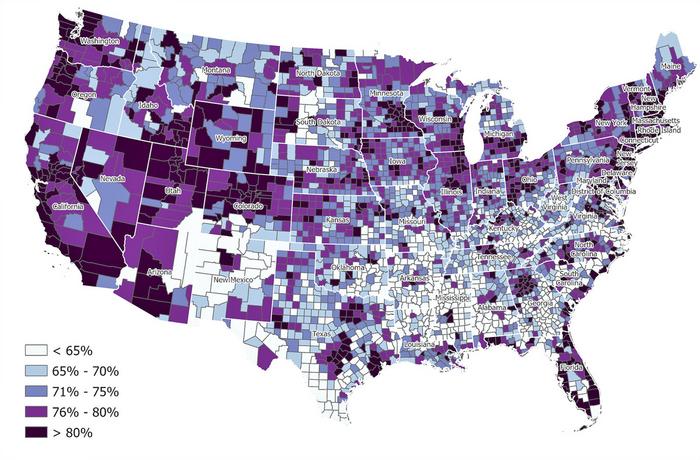Residents in rural counties with limited access to high-speed internet cannot take advantage of increasingly popular online health services.

Credit: UC
Residents in rural counties with limited access to high-speed internet cannot take advantage of increasingly popular online health services.
A new study by the University of Cincinnati highlighted disparities in access to digital technology that could widen the gap in access to health care. The study found that socially vulnerable communities in the United States face more barriers to adequate health care, live in areas with fewer health care resources and have less access to high-speed internet.
The study was published in the journal Mayo Clinic Proceedings: Digital Health.
The Biden Administration announced this year it will invest $73 million in outreach grants to provide affordable high-speed internet to more Americans. The program is designed to address a growing gap in access to health care created during the COVID-19 pandemic when providers began offering more health care services over the web.
UC researchers conducted a county-level data visualization and spatial analyses to assess the geospatial association between digital disparities and health care in the contiguous United States.
Study author and UC epidemiologist Diego Cuadros said patients need access to high-speed internet, computers or smart phones and familiarity with technology to use these systems comfortably so they can take advantage of the growing shift to telemedicine and online health services.
The study found that counties with the highest broadband access also had the strongest health care systems, lowest barriers to health care access and lowest social vulnerability.
Cuadros, an associate professor in UC’s College of Arts and Sciences, runs UC’s Digital Epidemiology Laboratory.
His previous research found disparities in easy access to health care across the United States. Many of these same areas have limited access to digital technology such as high-speed internet.
“This finding emphasizes the role that broadband access plays in accessing health care services, particularly during times like the COVID-19 pandemic,” Cuadros said.
“Patients in areas with low broadband access may face greater challenges in obtaining timely and convenient healthcare, leading to potential delays in diagnosis, treatment, and overall healthcare outcomes.”
A vast majority of counties with low broadband access and limited access to health care and social services were rural. About 21 million people, including 14 million rural Americans and more than 1 million Americans living on tribal lands, lack broadband access.
“Telehealth has an awful lot of merit, but the challenge is that telehealth assumes that a person has access to high-speed internet,” said study co-author Neil MacKinnon, provost for Augusta University.
“If someone doesn’t have that access, it can make it difficult for patients and doctors alike. This study shows that because of the digital desert concept, the technology divide really could have health consequences by contributing to a greater health divide in the country.”
University of Washington assistant professor of physiology and biophysics Claudia Moreno, F. DeWolfe Miller at the University of Hawaii, Honolulu, and Ryosuke Omori at Hokkaido University also co-authored the study.
“The study underscores the need for policymakers and health care leaders to prioritize efforts to improve broadband infrastructure, digital literacy and affordability to ensure equitable access to healthcare services for all patients,” Cuadros said.
Journal
Mayo Clinic Proceedings Digital Health
DOI
10.1016/j.mcpdig.2023.04.004
Method of Research
Data/statistical analysis
Subject of Research
Not applicable
Article Title
Assessing Access to Digital Services in Health Care–Underserved Communities in the United States: A Cross-Sectional Study
Article Publication Date
1-Sep-2023
COI Statement
No competing interests.




